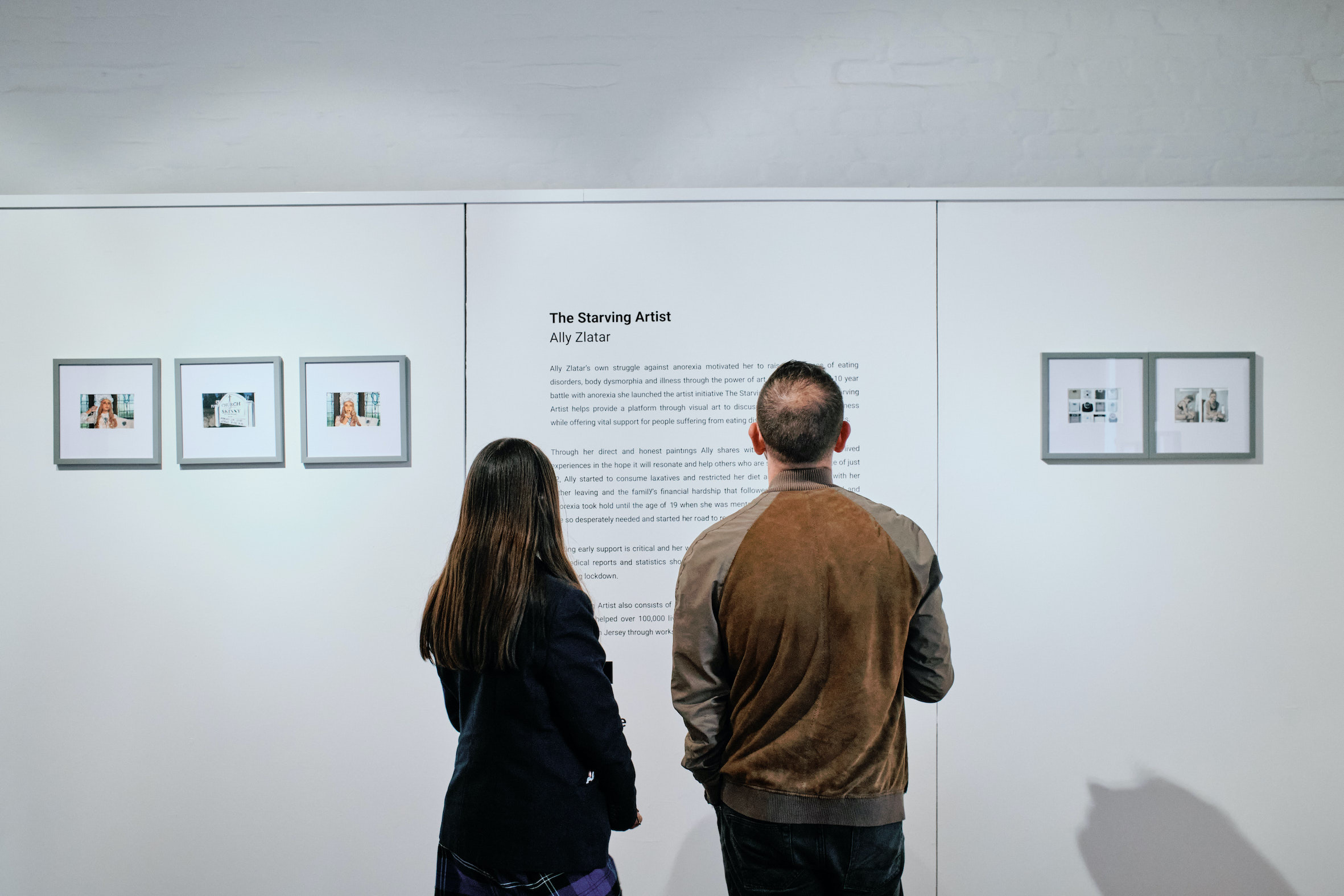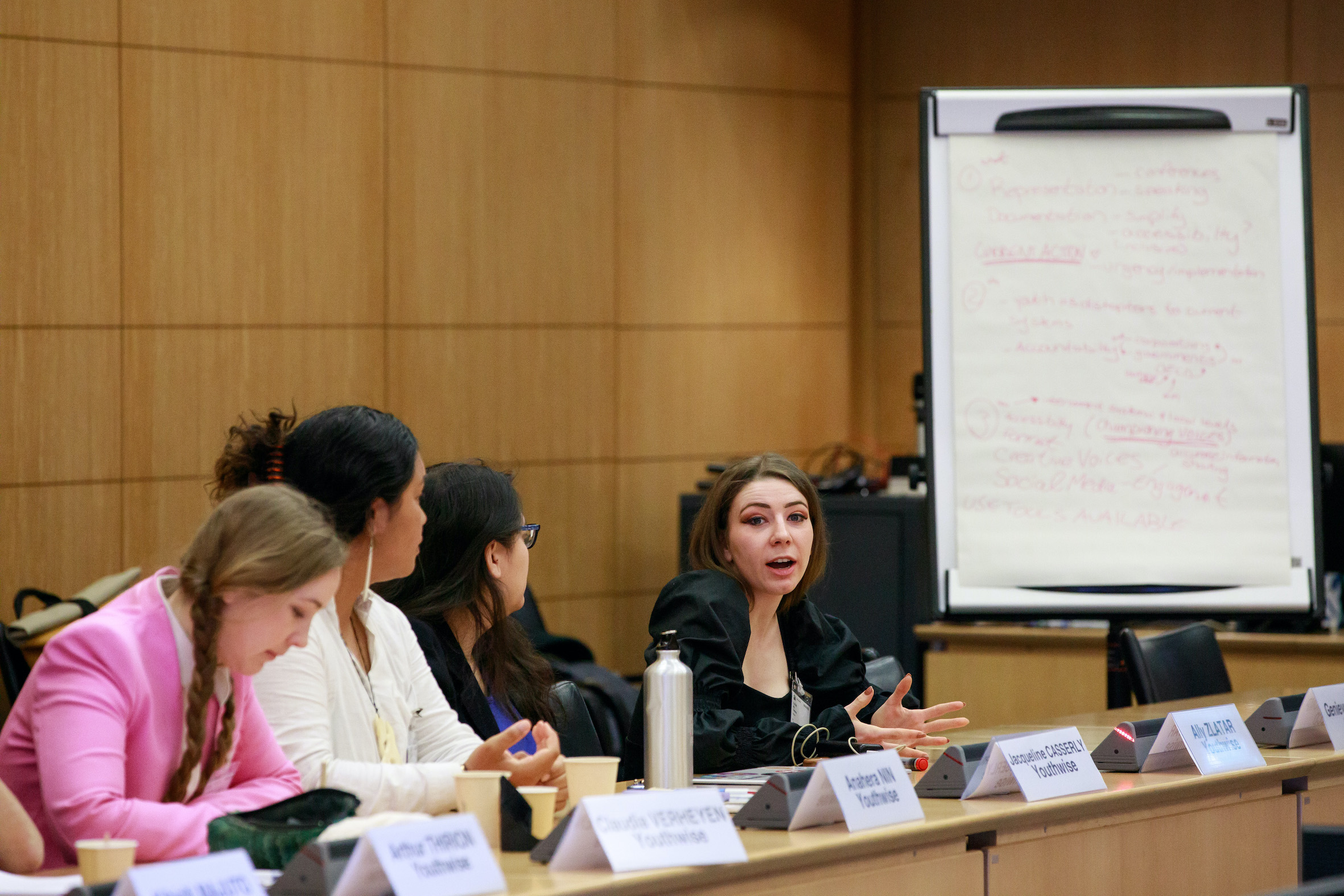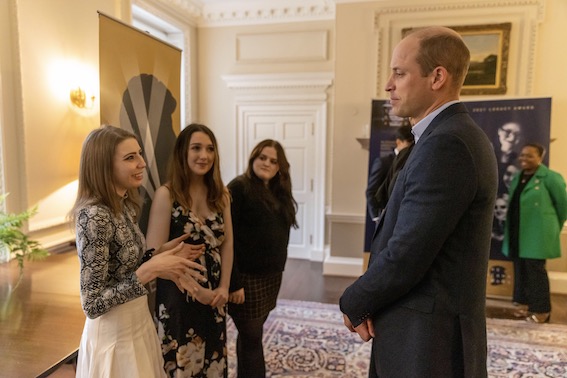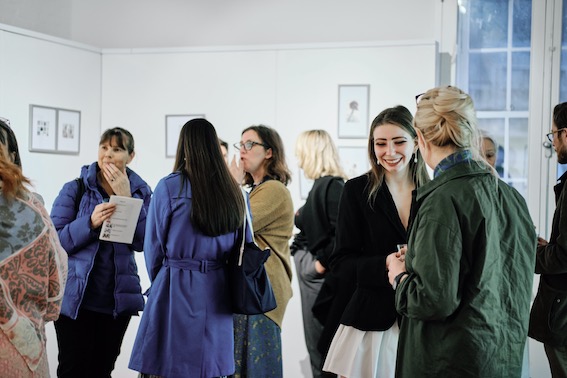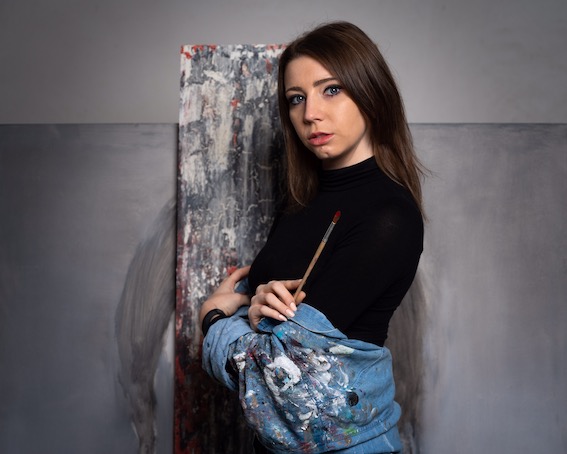Meet Ally Zlatar, Founder of The Starving Artist, an artist initiative that utilizes creative voices as a way to create advocacy and systemic reform. She has received the highest accolade a young person can achieve for her humanitarian work, such as the Commonwealth Innovation Awards, and the winner of The Princess Diana Legacy Award among others, she is a Lecturer at the University of Glasgow (Anderson College).
Who is Dr. Ally Zlatar? Define yourself.
Already off to a tough start… but I would say Ally Zlatar has been evolving. Ally once was a young girl from a displaced background who struggled with her mental health and had no one she confide in. As she got older, she found her voice through visual arts. Today I try to use my art, voice, and platform to help others to realize they do not need to suffer alone, and that everyone has the ability to ignite change especially through creative arts.
How were you as a kid?
I was a really weird kid. I was one of those that LOVED learning, constantly found myself asking questions in history class or spent hours reading philosophy papers at a young age. What also left a mark on me was joining Outreach club where I was able to volunteer at women’s shelters, youth groups and food banks. I loved helping others and kind of made that part of me whether I realized it or not at the time.
“Art evolved into an integral part of my identity, shaping who I am today. In a holistic sense, my journey enabled me to not only practice and teach art but also to utilize it as a transformative and creative force in my life. The central objective is consistently aimed at empowering marginalized communities to discover and express their voices through the creative arts. Participation is open to anyone with a willingness to learn or explore their personal experiences through the lens of art”
You hold a BFA in Visual Art & Art History from Queen's University & an MLitt Curatorial Practice and Contemporary Art from the Glasgow School of Art. Your Doctor of Creative Arts is with the University of Southern Queensland focusing on embodied experiences of eating disorders in contemporary art, why did you choose those courses of study?
I believe my journey began with a desire to pursue a career in teaching. Initially, I enrolled in art school with the intention of obtaining a degree in art education. However, my passion shifted towards the process of creating art, prompting me to transition into curatorial studies. This change allowed me to delve deeper into the world of art creation, moving beyond the confines of basic teaching. As I immersed myself in the art-world, I discovered my true voice and found a powerful outlet for processing my personal struggles, particularly a severe eating disorder that plagued me for over a decade. Art evolved into an integral part of my identity, shaping who I am today. In a holistic sense, my journey enabled me to not only practice and teach art but also to utilize it as a transformative and creative force in my life.
You are the founder of The Starving Artist; an artist initiative that utilizes creative voices as a way to create advocacy and systemic reform. You also founded The Starving Artist Scholarship Fund which helps people access inpatient treatment for eating disorders, where do these projects come from?
It came from my own struggles. I didn’t have a voice, a platform or really any tools to help me navigate my own wellbeing. It was an extremely tough journey for me and still I face obstacles. However, with this work I aim to help make it easier for others, so they do not have to suffer alone.
“It's important to acknowledge that the journey is laden with challenges, and determination becomes the key ingredient that propels us all forward despite the setbacks and hurdle
so sometimes the traditional approach sees art as an accessory but not as a tool for innovation which causes roadblocks and a lack of belief within the arts at large”
The Starving Artist initiative empowers people through creative arts, putting lived-in experiences at the forefront of systemic reform. Your focus is on championing emerging voices from the creative arts and teaching individuals to explore their experiences and express themselves creatively and it covers a wide range of topics including mental well-being, eating disorders, preventable diseases, women's rights, migrant experiences, and climate action, how does it work, what are the requirements to participate in this initiative etc?
The approach often varies based on specific projects or individual needs. Regardless of the thematic focus, the central objective is consistently aimed at empowering marginalized communities to discover and express their voices through the creative arts. Participation is open to anyone with a willingness to learn or explore their personal experiences through the lens of art.
Fundamental to this belief is the idea that art should be devoid of barriers to entry, including financial, linguistic, or socio-economic obstacles. Our commitment is to create formats that are inclusive and accessible to as many people as possible. Therefore, we refrain from charging artists any fees or requiring materials for submissions to our open calls or attendance at workshops. Through a range of diverse interventions and projects, we strive to impart art-based tools and offer platforms for emerging voices to delve into their creative potential.
You have received the highest accolade a young person can achieve for your humanitarian work; such as the Commonwealth Innovation Awards (2023), winner of The Princess Diana Legacy Award (2021), King Hamad Award for Youth Empowerment (2022), the Lieutenant Governor's Community Volunteer Award from the Ontario Government of Canada (2023) and also special recognition from The British Citizen Award (2022), also you a Lecturer at the University of Glasgow (Anderson College) and have taught at KICL London, and the University of Essex (UEIC). What´s the recipe for your success?
I wish there was a secret recipe, but what is really is resilience. The public sees the accolades and the milestones, but let’s be realistic here because every day I get countless rejection letters, applications that were passed on and months that go into projects to see the end result that looks so easy. It's important to acknowledge that the journey is laden with challenges, and determination becomes the key ingredient that propels us all forward despite the setbacks and hurdles.
“Art is not an accessory on gallery walls or just a pretty painting. It is such a valuable tool and method for communication that transcends our daily lives and allows us a glimpse into understanding the complexities of the human experience”.
What’s the biggest lesson you’ve learned over the years?
Real change takes time. If it was easy, it would already be done.
Do you have a book, podcast, or talk that’s had a deep impact on your thinking?
The School of Life or anything by Alain De Botton. His ability to provide wisdom for understanding and living in the modern world has helped me through some tough times.
Do you have any particular philosophy that guides your career decisions?
Not a philosophy, but a little bit of stubbornness to prove someone wrong. There was a pivotal moment when I received a critical remark stating, 'No one wants to be associated as a starving artist.' However, to this day, I remain steadfast in my belief that my work should not shy away from the harsh reality or shy away from highlighting the struggles of marginalized communities.
What does a normal workday look like for you?
I wake up around an ungodly hour of 5 am, dedicating my morning hours until 8 am to The Starving Artist project. Following a brief pause for Genmaicha Tea and a quick bite, I walk to my workplace by 9 am for the typical 9-5 routine. Once I return home in the evening, I reserve that time for relaxation, whether it involves working on art projects, spending quality moments with my partner, or indulging in a bit of reality TV until around 9 pm. Prioritizing a good night's sleep is crucial to me, and I find that life is all about maintaining a delicate balance and striving for stability.
“I strive to always help others and be able to push through, find solutions and work hard to help make things better the best I can”
What do you love most about your job? & what is the most difficult part?
I love helping students / emerging practitioners build their abilities. It is always heart-warming making those connections and seeing them develop and find their passions. What is the most challenging aspects is the bureaucracy behind the scenes. I tend to not be a fan of the rigidity of academia, so sometimes the traditional approach sees art as an accessory but not as a tool for innovation which causes roadblocks and lack of belief within the arts at large.
What is one strategy that has helped you to grow your business?
Cross-industry collaboration, I learned a lot while also being able to provide new approaches to other communities and networks.
What do you like to do in your spare time?
I watch a lot of reality tv and baking shows. I also balance it out with reading and writing philosophical works and painting. My eclectic mix definitely allows me to appreciate both the light-hearted and the profound aspects of my life.
Many authors say women can and must strive to have everything – a shining career, a blossoming family life, and a perfectly balanced lifestyle all at once, others point out that– then women are placing unrealistic expectations on themselves if they believe they can have it all, so according to your experience, what do you think about these statements?
Painfully accurate, especially in our modern age we live in a digital panopticon where our pressures as women are also amplified with online presence and further heightening the demands and having a presence in-person and online that we attain to these standards. I would be naive to think I am an exception to this, but in fact a lot of my struggles came from feeling like I was never enough, or working hard enough or that I was enough to be loved. Based on my experiences, we definitely need more conversations and understanding of the impacts of these unattainable and idealistic lives and roles for women.
“The biggest challenge has been to overcome these limited assumptions about my abilities and that has mainly been through persistence and creating my own spaces and opportunities when often I was excluded from traditional forms”
What are your plans for the future?
Short-term would be to continue to ignite projects and communities through art-activism. Long-term would be to establish The Starving Artist as a leading organization in art advocacy and potentially become a tenured Professor in Socially Engaged Arts Practices (if anyone is reading this looking for someone to fill this role, please email me lol ).
I have noticed that there are people who devalue the role that art plays in mental health, to bring happiness and other positive effects in people's lives. What are the “myths” that you would like to dispel about art?
Art is not an accessory on gallery walls or just a pretty painting. It is such a valuable tool and method for communication that transcends our daily lives and allows us a glimpse into understanding the complexities of the human experience in a way that words or even scientific analysis can be hindered by.
There is still a glass ceiling for women in the world: Fewer opportunities, jobs underpaid just for the fact of being a woman, etc. Have you experimented with the glass ceiling? If yes, what are the biggest challenges you have faced and how have you overcome them?
Yes, being transparent about my appearance I am a petite 5’2 young female. I have a high-pitched voice like a kids’ cartoon character. I do not look the part of a doctor, or an established artist, or an expert on eating disorders, I look weak… The biggest challenges has been to overcome these limited assumptions about my abilities and that has mainly been through persistency and creating my own spaces and opportunities when often I was excluded from traditional forms i.e, medical practitioners saw me as a teen girl suffering from an eating disorder. They prescribed me treatment on what they thought would be best. However, now I champion for people-centered treatment where patients know themselves the best and should be working with practitioners to address their individual needs. It’s a long-winded answer to say glass ceilings can affect so many women in different ways but we all need to fight and work together to counteract its effects.
What tips, can you give to young girls who want to become an entrepreneur like you?
Do what you love, and there will be an audience. Find your passion and let it guide your work. It may not always be easy, but if you love what you do, the hard work will be worth it.
I think in your position, many people may have the wrong idea of who you are, and what do you (professionally), with this idea in mind, what is being Ally and what is not?
Being Ally can actually really grim at times. My family life is a mess, I come from a low-socioeconomic background and the first in my family to get a doctoral degree. In my university years I would work two jobs just to be able to afford school. It made me truly appreciate education and loved every moment in class since learning was so important to me. I am neuro-divergent, struggle with an eating disorder and my family is riddled with many family members facing severe mental health struggles alongside my own. Some days is just tough to get by. Like many of us, we do not always share these, but I think it is important to highlight why I am what I am today. What Ally is definitely is resilient. These just highlighted some but despite MANY challenges I strive to always help others and be able to push through, find solutions and work hard to help make things better the best I can.
Who is the woman you admire the most and why?
Marina Abramovic, a Serbian conceptual artist who puts herself through remarkable physical, mental, and emotionally challenging situations, exposing her struggles for the sake of art creation. I admire her for ability to communicate these authentically, vulnerably, and bravely.
Something else you want to add or share with us?
Just going to mention if it is of interest please do check out and support The Starving Artist in any way you can:
https://starvingartist.cargo.site/
https://www.instagram.com/thestarvingartist.studio/
Name: Dr Ally Zlatar
Sector: Art
Company: The Starving Artist Designation: Founder Country: CANADA
Social media:
https://allyz.cargo.site/ https://starvingartist.cargo.site/
https://www.instagram.com/allyzlatar/ https://www.linkedin.com/in/dr-ally-zlatar-81597b120/

